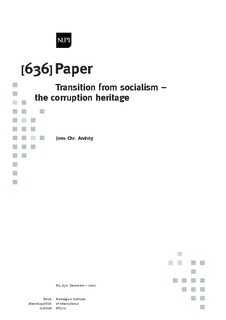| dc.contributor.author | Andvig, Jens Christopher | |
| dc.date.accessioned | 2016-06-28T09:16:30Z | |
| dc.date.accessioned | 2016-06-29T12:12:11Z | |
| dc.date.available | 2016-06-28T09:16:30Z | |
| dc.date.available | 2016-06-29T12:12:11Z | |
| dc.date.issued | 2002 | |
| dc.identifier.citation | Working Paper, NUPI nr 636. NUPI, 2002 | nb_NO |
| dc.identifier.issn | 0800 - 0018 | |
| dc.identifier.uri | http://hdl.handle.net/11250/2394721 | |
| dc.description | - | nb_NO |
| dc.description.abstract | The paper explores the apparently high incidence of corruption in those former socialist countries where the Communist Party lost power. It argues that part of the explanation of the high corruption incidence is to be sought in the simultaneous production decline which gives rise to a Schumpeter effect, where former bureaucrats are becoming corruption entrepreneurs. Another important factor is the swift change in the ruling norms giving rise to a Huntington effect an overshooting of the applicability of the market mechanism. An important driver of both effects is the monetation of the centralised multitiered bartering system of the old socialist economies. That process is briefly compared to older forms of market expansion into decentralised non-market agricultural economies as analysed by Polanyi and Marx. | nb_NO |
| dc.language.iso | eng | nb_NO |
| dc.publisher | NUPI | nb_NO |
| dc.relation.ispartofseries | NUPI Working Paper;636 | |
| dc.rights | Navngivelse-Ikkekommersiell-DelPåSammeVilkår 3.0 Norge | * |
| dc.rights.uri | http://creativecommons.org/licenses/by-nc-sa/3.0/no/ | * |
| dc.title | Transition from socialism - the corruption heritage | nb_NO |
| dc.type | Working paper | nb_NO |
| dc.date.updated | 2016-06-28T09:16:29Z | |
| dc.source.pagenumber | 65 p. | nb_NO |
| dc.identifier.cristin | 1364666 | |
| dc.subject.keyword | Utviklingspolitikk / Development policy | |

